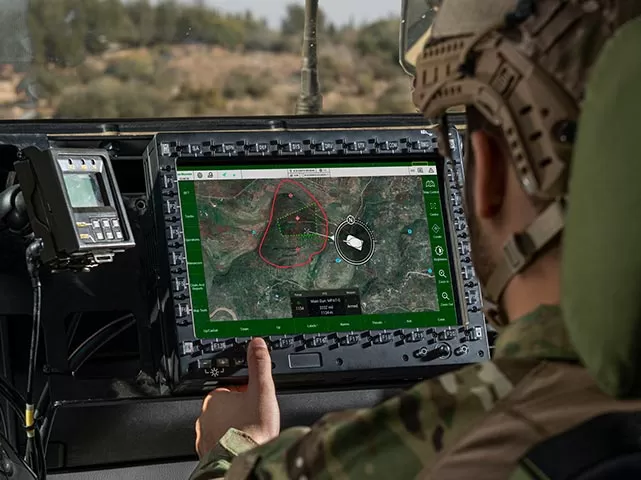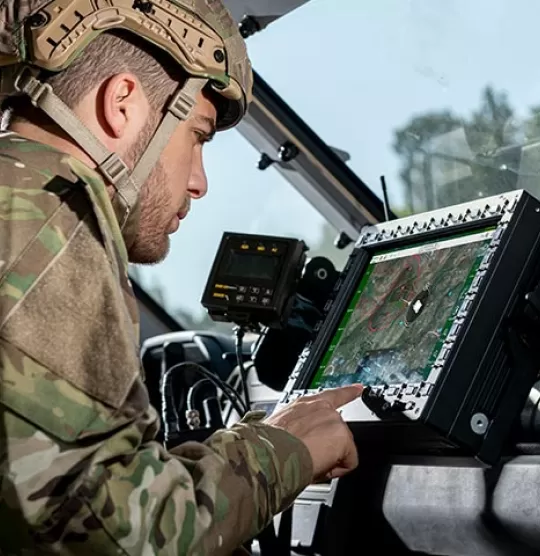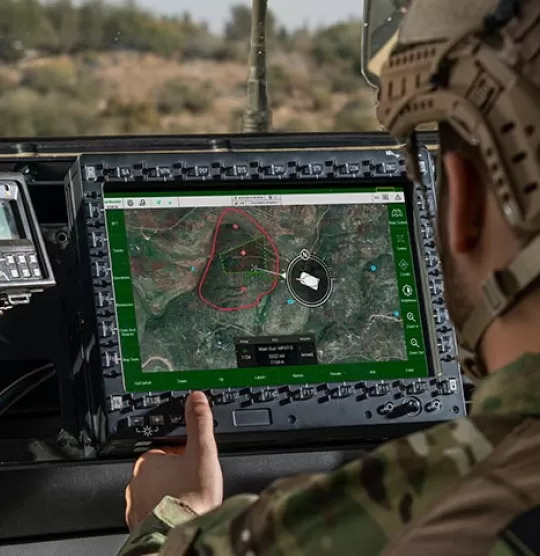
Beyond Armor Lies the Power of Tactical Computing
With the ability to withstand extreme environments and deliver mission-critical information, advanced military systems are transforming how armed forces operate.
The key to modern military success goes beyond strategy and manpower – it’s about the seamless flow of information. Whether soldiers are navigating diverse terrains or engaging in combat, one thing remains critical: fast, accurate, and secure data.
Computing devices, and especially tactical computers, lie at the core of this essential communication network, acting as the quiet yet indispensable backbone that keeps commanders and soldiers informed, coordinated, and ready for action.
Niv, Elbit Systems' C4I and Cyber Head of Tactical Hardware products line, explains the importance of these solutions: “In order to integrate and operate C4I systems within armed forces and demanding environments – whether for Command Posts, Tanks and Guns, APCs, or even Joint Light Tactical Vehicles – you need a reliable computing platform that will perform when it is needed most, whether in exercises or on the battlefield."
Why Tactical Computers Matter
On the battlefield, seconds can determine the outcome. Traditional computing and communication tools, while still useful, are prone to disruptions and failures as a result of environmental conditions, jamming and interceptions, which can jeopardize a mission. Tactical computers are engineered, together with the C4I infrastructure, to minimize these risks. They provide real-time processing of command and control (C2) data and tactical information, aiming to ensure that soldiers and commanders receive timely and accurate updates.
These computers aren’t just rugged versions of commercial devices. "In the military world, you have to ensure that computing products meet the unique demands of the defense sector," says Niv.
"One thing that sets military products apart is their resilience," he explains. This includes the ability to endure extreme conditions – be it high temperatures, humidity, ballistic shocks or electromagnetic interference from nearby communication devices. Tactical computers are designed to operate in environments where commercial off the shelf (COTS) hardware would fail, aiming to ensure a reliable, secure, and constant flow of mission-critical data.
"These specific requirements," Niv adds, "are what make the military computing market unique, and why our customers usually won’t settle for civilian-oriented computers."
Meet the ETCs
A prime example of these advanced products is Elbit Systems' Enhanced Tactical Computers (ETCs), which have proven their effectiveness in a wide range of military scenarios around the world. Designed for use by Land forces, both mounted and dismounted, ETCs can be deployed and customized across various platforms, from tanks and artillery to wheeled and tracked combat vehicles.
The ETC, in its latest model, is equipped with Elbit's latest Intel hardware, delivers exceptional performance in demanding operational environments. Its flexible design allows for customization to meet specific customer's needs, so that each user has a solution as tailored as possible to its requirements—whether for seamless integration with radio systems or handling complex data streams. Additionally, its rugged design ensures resilience under the harshest battlefield conditions.
Currently, Niv and his team are developing the next generation of tactical computers. "To stay relevant and have our products incorporate the latest technology, we continuously develop new computer generations, using a creative design approach to help shorten the time-to-market for these products. Each development cycle results in an advanced, modern computer with a high level of customization aiming to meet the specific needs of our customers. We build the solution from the ground up, based on a detailed analysis of the client's requirements." This high degree of customization is helps to set Elbit’s ETCs apart from other tactical computing products on the market.
The Future of Tactical Computing
As warfare advances with developments in AI, cyber warfare, and autonomous systems, tactical computers will continue to play an important role in defense infrastructure.
Their ability to integrate multiple systems – from sensors to satellite communications – may become even more important, facilitating decision-makers' access to comprehensive data in a quicker and securer manner.
As Niv emphasizes, "In military operations, ruggedization isn't just about preventing hardware failure; it's about maintaining operational superiority. If a critical mission fails due to a computer crash, the army's readiness is compromised, and lives may be at risk."
The content of the article does not constitute business or financial information about Elbit Systems Ltd. (the "Company") and is not intended to be a basis for making investment decisions in the Company's securities. In order to obtain business or financial information about the Company, please refer to the reports and filings that the Company regularly publishes on the website of the U.S Securities and Exchange Commission (EDGAR) and on the notification system of the Tel Aviv Stock Exchange (Maya).
The article may contain forward-looking statements such as estimates, forecasts, estimates, plans, etc. that refer to future events that are considered forward-looking information as defined under the securities laws of Israel and the United States. There is no certainty that such information will be realized, in whole or in part, and the actual result may differ from what was presented in the article, among other things due to its dependence on external factors that are not under the control of the Company and that cannot be evaluated in advance. The forward-looking statements are based on the Company's estimates at the time of publication, and the Company has no obligation to update or correct this data.



